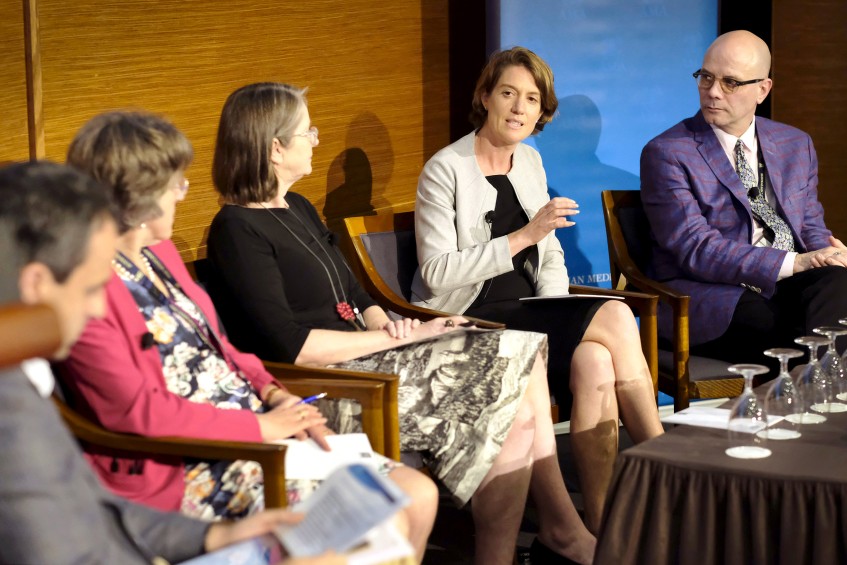MP’s begin debate on Euthanasia Legislation: Rally to add opposition voice

Keynote speakers at the AMA (WA) End-of-Life Choices and Palliative Care Symposium in Perth on 5 May 2018. Western Australian Legislative Assembly MP’s this week began debating a bill to legalise euthanasia and doctor-assisted suicide. Photo: Australian Medical Association Western Australia.
Western Australian Legislative Assembly MP’s this week began debating a bill to legalise euthanasia and doctor-assisted suicide.
The WA Catholic community and beyond are being urged to join in the Care: Not Killing Rally, at 12 noon, Wednesday September 4, at Parliament House, as a means of adding their voices to oppose the introduction of physician assisted suicide.
According to national data, WA has the lowest number of publicly funded palliative care beds per capita in the nation.
WA Palliative Medicine Specialist Group Chairman Dr Anil Tandon told WA Today that only one in three Western Australians who need specialist palliative care have access to it.
Royal Perth Hospital only provides specialist palliative care during office hours, according to Professor Doug Bridge, the former head of palliative care at the hospital.
"I worked at Royal Perth for 20 years as head of department and still five years later I look and there's still no palliative care people on the weekend," he said.
"So Friday night, a patient is in pain, vomiting, breathless, they have to wait until Monday morning to see a specialist. You can't afford to pay them and that's been going on for decades."
Dr Tandon stated that it was no coincidence that states with the worst palliative care have the greatest public support for euthanasia.
"If we join those two issues together, the current investment in palliative care and the current demand for euthanasia, what we see is that the two states with the lowest funding for palliative care are Victoria and Western Australia," he said.
"If there hasn't been an investment, well the public is going to want a solution to their distress."
There are only 15 full-time-equivalent palliative care specialists across WA, well under the 50 FTE positions recommended by national benchmarks.
The West Australian has this week reported that WA doctors are demanding tougher controls over the way a lethal drug will be made available to patients under the state’s proposed controversial voluntary euthanasia laws.
Australian Medical Association WA President Dr Andrew Miller said on Saturday that there were not enough safeguards to prevent the proposed system – in which a lethal drug can be taken by patients at home – being abused.
He said the undisclosed lethal concoction, to be prepared by a registered pharmacist, should be administered at a health facility under supervision –not at a person’s home.
Dr Miller also said there should be time limits placed on how long the drug can remain at a person’s home before it is administered.
“We already have great concerns about things like opiate drugs in the community and we think there are far too many of those out there,” he said.
“This is a poison and if it falls into the wrong hands it could be dangerous.”
Under new Voluntary Assisted Dying legislation, to be debated in the West Australian Parliament this week, a lethal drug – prepared by an authorised supplier – can be administered by a practitioner.
But the lethal drug can also be taken at home by a patient, unsupervised, after being delivered to a patient’s home where it could be administered at a time of their choosing.
Patients will be able to “doctor-shop” for any two doctors, who do not need to be financially independent, nor have expertise in palliative care or in the patient’s condition.
The doctors are required to falsify the cause of death on the death certificate.
In a statement released this week, the Coalition for the Defence of Human Life has said that in a state with dire statistics relating to elder abuse, mental health and youth suicide, the WA government must instead fix chronic underfunding of palliative care, especially as regional and rural WA are being denied equal access to specialists.
“WA has under one third of the palliative care specialists required by national benchmarks and the state needs more than $100 million in annual spending on palliative care for staffing and education, in addition to funding for infrastructure such as palliative care wards and beds,” said Family Voice Australia Western Australia State Director, Darryl Budge.
“Wrongful deaths are guaranteed by this bill, which has even less safeguards than Victoria,” he said.
“No permit will be required to ensure a legal and robust process.
“There is no requirement for expert assessment of patient capacity.
“Evidence from WA’s Chief Psychiatrist on the importance of psychiatric assessments was ignored,” Mr Budge explained.
The midday rally, to be held on Wednesday 4 September on the steps of Parliament House, Perth, will also be an opportunity to hear from medical and legal experts on the risks and impact of assisted suicide in those jurisdictions where it has been legalised.
Other free events being held by The Coalition for the Defence of Human Life include a presentation from Kevin Dunn, the producer of the documentary Fatal Flaws, , at Mt Pleasant Baptist Church, 497 Marmion Street, Booragoon on Wednesday 4 September at 7.30pm. Fatal Flaws will be screened on Thursday 5 September at Victory Life Centre, 1 Neil Street, Osborne Park.
For more information, go to www.facebook.com/CoalitionForHumanLife/Events
